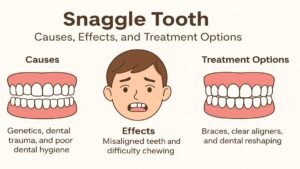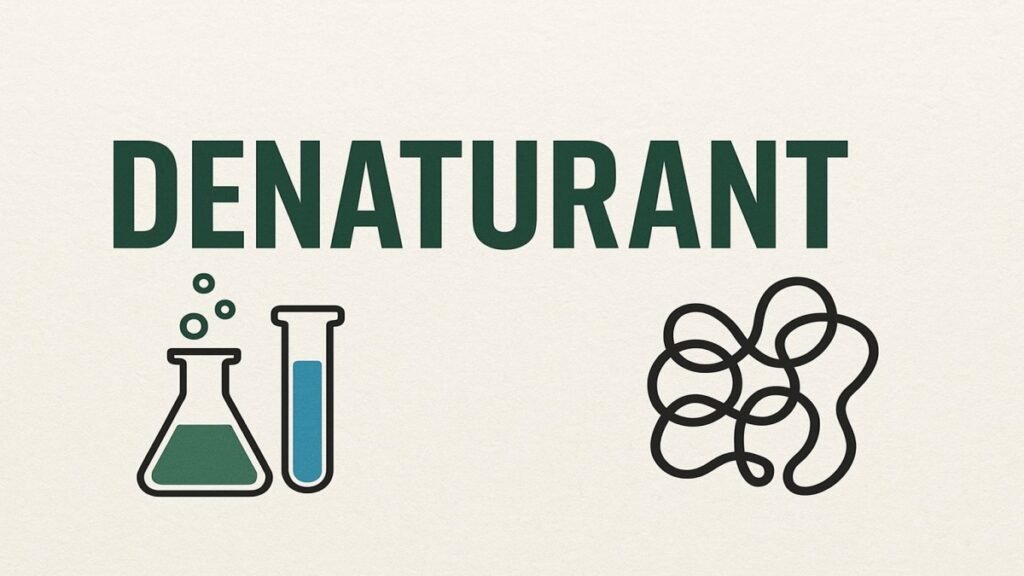Introduction
Ever wondered why industrial alcohol smells so different from the one you drink? The answer lies in denaturants. These are chemicals or processes that alter a substance’s natural properties, making it unsuitable for consumption while keeping its industrial use intact. Denaturants play a crucial role in biochemistry, the alcohol industry, and even food processing.
What is a Denaturant?
A denaturant is any chemical or physical agent that disrupts the natural structure of a molecule—especially proteins and nucleic acids—without breaking its primary bonds. In simpler terms, it changes the way a substance functions without completely destroying it.
Why is Denaturation Important?
Denaturation ensures that materials serve their purpose in industrial or scientific contexts without being misused. For example:
- Alcohol is denatured so it can be used in cleaning or cosmetics without being consumed as liquor.
- Proteins are denatured in labs to study their structure and function.
Historical Background of Denaturants
The use of denaturants dates back to the early 20th century when governments wanted to prevent people from drinking industrial alcohol. Since then, their use has expanded to pharmaceuticals, food technology, and scientific research.
Types of Denaturants
Chemical Denaturants
These include acids, bases, solvents, and other chemicals that alter molecular structures.
Physical Denaturants
Heat, radiation, and pressure are non-chemical means to denature proteins and other molecules.
Biological Denaturants
Enzymes and other biological factors sometimes act as denaturing agents.
Common Chemical Denaturants
Alcohol-Based Denaturants
Methanol and isopropanol are often added to ethanol to make it undrinkable.
Acids and Bases
Strong acids like hydrochloric acid or bases like sodium hydroxide denature proteins quickly.
Heavy Metals
Mercury and lead ions can bind to proteins and disrupt their function.
Physical Denaturation Methods
Heat
Think of cooking an egg—heat denatures its proteins, turning the liquid egg white solid.
Radiation
UV and gamma radiation can denature DNA and proteins, used in sterilization processes.
Pressure
High-pressure processing in the food industry denatures proteins for preservation.
Denaturants in Biochemistry
Protein Denaturation
Proteins lose their shape (and function) when exposed to heat, chemicals, or mechanical stress.
Nucleic Acid Denaturation
DNA strands separate under heat, a process used in PCR (Polymerase Chain Reaction).
Denaturants in the Alcohol Industry
Denatured alcohol is ethanol mixed with chemicals like methanol to make it unsafe for drinking. This prevents tax evasion and ensures alcohol is used only for industrial purposes.
Denaturants in Food Industry
Some denaturants are used to preserve food by altering proteins and enzymes. However, their use is carefully regulated to avoid health hazards.
Industrial Applications of Denaturants
- Pharmaceuticals – Used in drug formulation and sterilization.
- Cosmetics – Found in perfumes, sanitizers, and lotions.
- Cleaning agents – Added to alcohol-based cleaners to enhance effectiveness.
Denaturants and Environmental Concerns
Denaturants, especially chemical ones, can be toxic to the environment. Proper waste management and eco-friendly alternatives are crucial.
Health Risks of Denaturants
- Accidental ingestion can cause poisoning or death.
- Skin contact may lead to burns or rashes.
- Inhalation of fumes can damage the respiratory system.
Regulations on Denaturants
Governments worldwide impose strict rules to regulate the use of denaturants, especially in alcohol production. The EU, USA, and India all have specific guidelines for safe use and labeling.
Future of Denaturants
Research is now focused on finding safer, biodegradable denaturants that minimize health and environmental risks while still serving their industrial purpose.
Conclusion
Denaturants may seem like small additives, but they play a huge role in science, industry, and safety. From protecting people against alcohol misuse to helping researchers study proteins, these agents are everywhere. The challenge ahead is to balance effectiveness with safety and sustainability.
FAQs
1. What is the main purpose of a denaturant?
To alter a substance’s natural properties so it cannot be misused, especially in industrial alcohol.
2. Can denatured alcohol be made drinkable again?
No, the added chemicals are toxic and make it unsafe for consumption.
3. Is cooking food an example of denaturation?
Yes, heat denatures proteins in food, such as eggs and meat.
4. Are all denaturants harmful to humans?
Not all, but many are toxic if ingested or inhaled, so safety precautions are necessary.
5. What industries use denaturants the most?
Alcohol production, pharmaceuticals, cosmetics, food processing, and research laboratories.








